What is Kaizen?
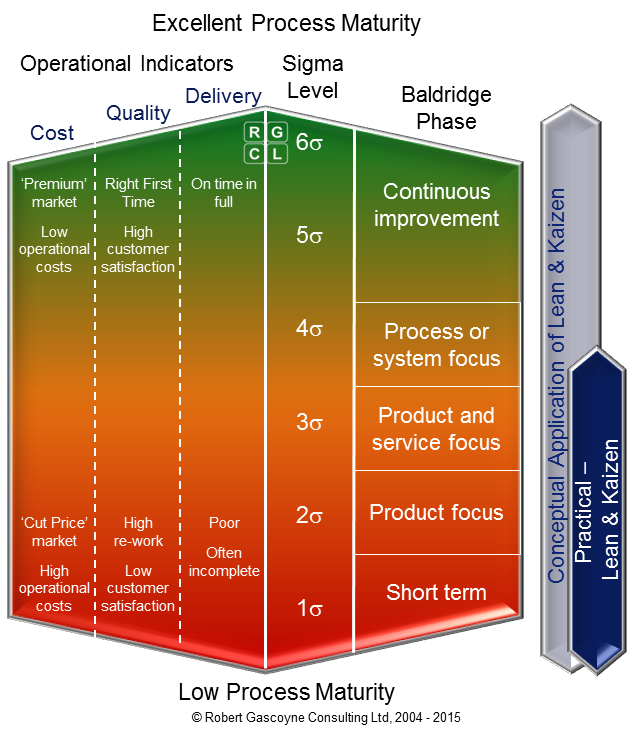
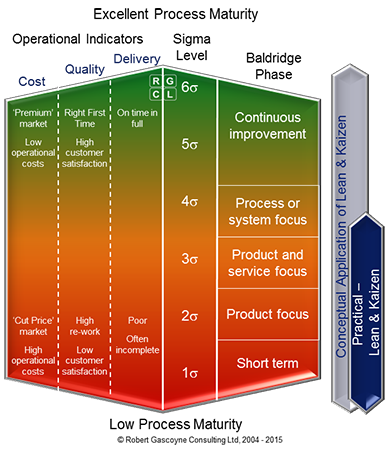
- The word ‘Kaizen’ has been adopted from a Japanese phrase, meaning ‘change for the better’, or ‘continuous improvement’
- The Kaizen philosophy is that your people are empowered to improve the processes they operate or are responsible for
- Kaizen teams use the Lean methodology to plan, execute and review their changes as a continuous part of their everyday roles
- As Lean focuses on eliminating waste, applying Lean through Kaizen improves process efficiency
- However, Kaizen at it best is much more than this - it is also a fantastic way of promoting cultural change, by encouraging people to take an interest and then make positive changes to the things they care about!
- It is highly effective at improving poor to moderate business processes. However, good processes also benefit from Kaizen, as its many tools, techniques and philosophies lay the foundations for process excellence
- A variation of Kaizen is the ‘Kaizen Blitz’, also known as ‘Kaikaku’, which is Japanese for ‘instant revolution’
- As the name suggests this is a very quick improvement exercise, which can result in step change
- Best of all, Kaizen is fun, exciting, challenging and addictive!
Why we get results
- We have substantial experience deploying Kaizen
- We can help you specify the best approach for your business (see Diagnostics for more details), or simply provide whatever consultancy, training and coaching you require
- We’re practical and pragmatic - our focus is always on getting results (we’re practitioners - not just trainers!)
- We tailor our services and approach to meet your needs (please see methodology deployment requirements diagram below)
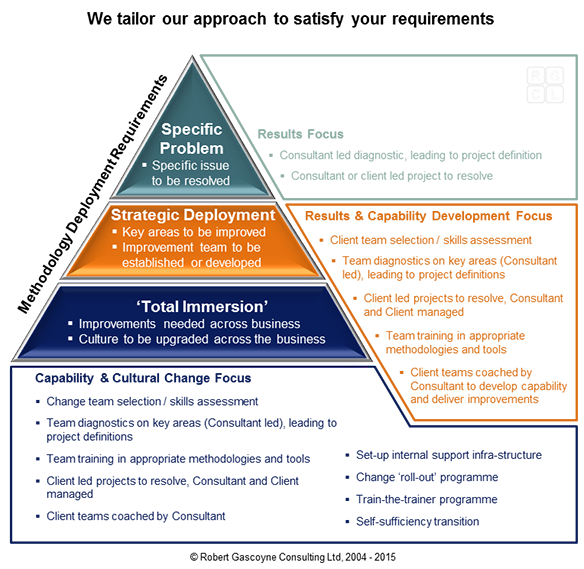
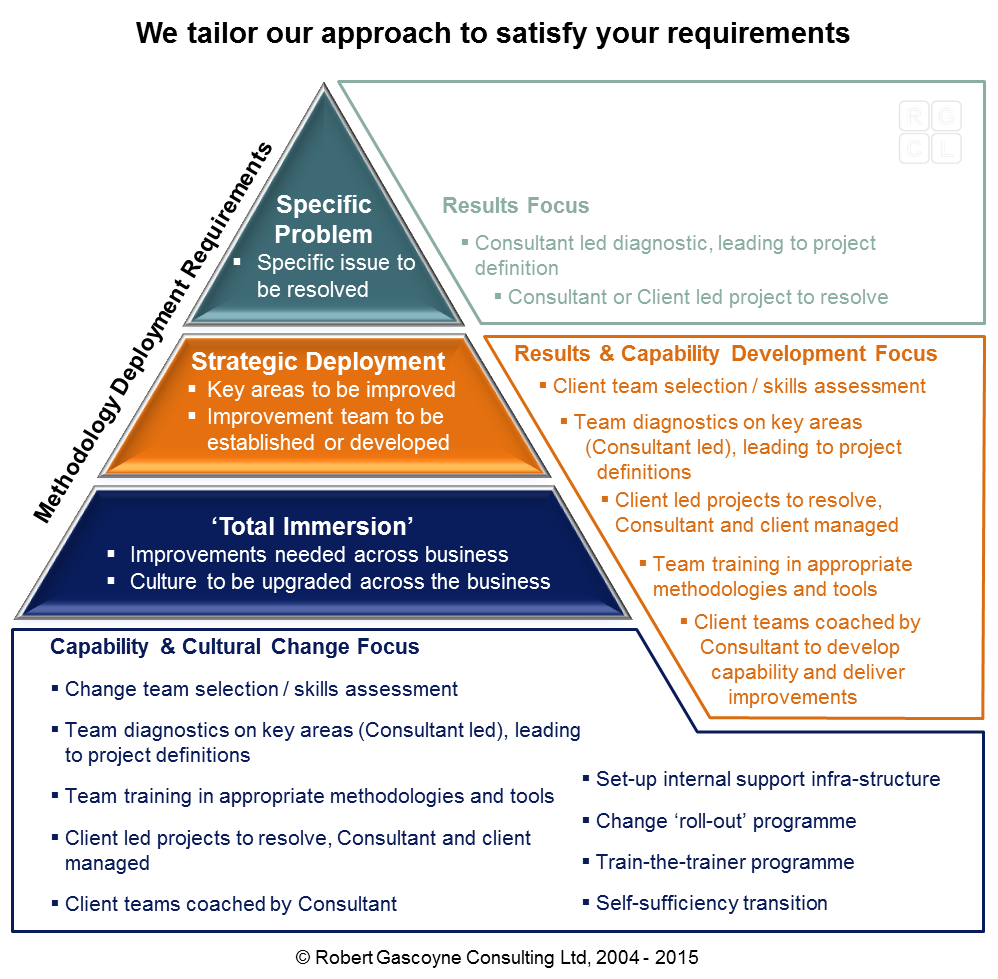
There are three basic levels to deploy any methodology:
- At a basic level a methodology can be used to solve a specific problem
- Methodologies can also be deployed strategically to resolve strategic issues across the business. Generally, this involves developing capability within the business to achieve this
- Often, businesses decide to apply a uniform approach to business improvement across their entire business. This, ‘total immersion’ approach, involves developing a 'critical mass' of capability within the company, with support structures to ensure that it is self-sustaining
- We can help you, whatever deployment model you choose - please contact us to discuss your requirements
Capability Development
The level of capability development is an important factor in Strategic and ‘Total Immersion’ deployments
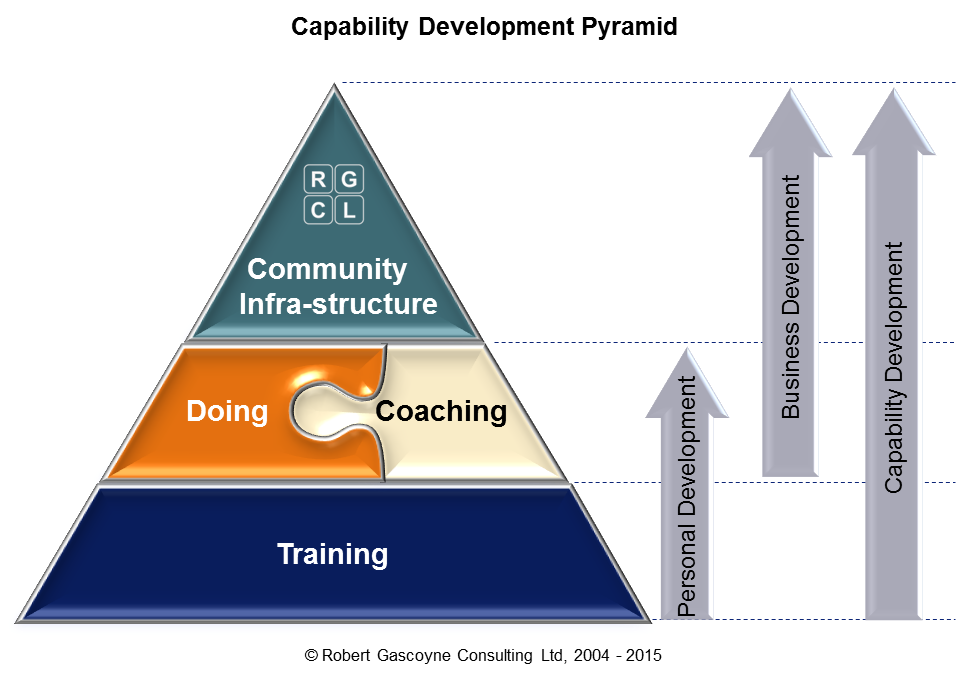
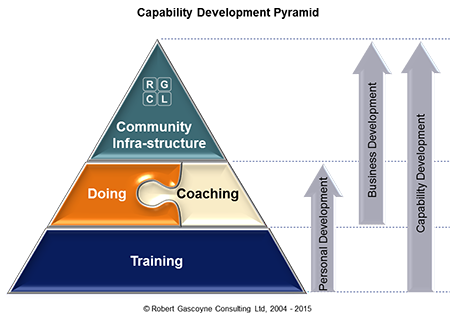
- Training provides knowledge, but real understanding is only developed by doing
- We offer a range of coaching services, to guide capability development and ensure that results are achieved
- Beyond having people that can do, you’ll need your own, sustainable, support structure to ensure the continued growth and success of your capability - we'll help you create, or develop, your infra-structure to achieve this
Training, Coaching & Support
Besides full deployments, we also offer the individual components, to support and supplement existing programmes:
Change doesn’t have to be top-down…
…cultural change can be delivered 'bottom-up', empowered through Kaizen
- Kaizen training: bespoke and ’off-the-shelf’, from awareness and champions training, through to detailed courses for practitioners and train-the-trainer courses
- Kaizen coaching: a range bespoke of support options to ensure that both personal capability and business results are achieved. These range from providing a full-time support team to remote support options, as appropriate
- Kaizen community infra-structure: Bespoke services to design, develop and install appropriate capability support and development infra-structure
Please contact us to discuss your requirements
Next Steps
We’d be glad to provide more details, or discuss your requirements with you. Please contact us
Related Tools, Techniques & Methodologies
We offer consultancy (diagnostics, project definition, projects, deployments, training, coaching and results with the following Lean related tools, techniques and methodologies:
Basic Lean Concepts
- Value Add / Non-Value Add (VA / NVA)
- Taiichi Ohno’s 7 Wastes (Muda)
- TAKT time
- Deming Cycle
- Just In Time (JIT)
- Kanban
- Go to the workplace (Gemba)
- Kaizen & Kaizen Blitz (Kaikaku)
- 5S
- Mistake Proofing (Poka Yoke, Poke Yoke)
- Single Minute Exchange of Dies (SMED)
- Cost of Quality (CoQ, CoPQ)
Advanced Lean Concepts
- Goldratt - Theory of Constraints & Bottlenecks
- Level Scheduling (Heijunka)
- Runners, Repeaters and Strangers
- Autonomation (Jidoka)
- Agile Design and Manufacture (Mass customisation, late point differentiation)
- Supply Chain Flexibility Mapping (P-time studies)
- Zero Defect Manufacture (ZDM) / Zero Quality Control (ZQC)
- Cellular Manufacture, Group Technology & Flexible Manufacturing
- Moments of Truth (MoT)
- Product Design Tools – see Design for Six Sigma (DFSS) section
Basic Quality Tools
- Process Chart
- Flowcharting
- Pareto Analysis
- Cause & Effect Diagrams (Fishbone, Ishikawa)
- Concentration Diagrams (Measles chart)
- Check Sheets
- Five Whys
- Spaghetti Diagrams
Advanced Quality Tools
- Value Stream Mapping (VSM)
- Failure Mode and Effects Analysis (FMEA)
Graphical Data Analysis
- Histograms
- Run charts (Time series plots)
- Scatter diagrams & basic correlation
Organisational Tools
- Affinity Diagrams
Process Control
- Standard Operating Procedures (SOP)
- Out of Control Action Plans (OCAP)
- Statistical Process Control (SPC)
- Process Capability (Cp, CpL, CpU, CpK, Pp, PpL, PpU, PpK, PPM)
- See Statistical Tools page
Statistical Tools
- See Statistical Tools page
- or Six Sigma section
Management
- Hoshin Policy Deployment
- Management Systems
- Short Interval Control (SIC)
- Project Status Reporting
- Critical Path Analysis
- Gantt Charts
- Network Charts
- PERT Charts
- Time Management
- Mental planning models (GRPI, TSRE, OSCA)
- Multi-Generation Project Planning (MGPP)
- See Management Tools page
Tactical skills
- Change Management
- Conflict Management
- Effective Meetings
- Faces of resistance
- Facilitation
- Stakeholder analysis
- Leadership
- Team building
- See Management Tools page
More Tools
- See Kaizen page
- See Design page
- See Product Cost Reduction page
- See Lean Six Sigma page
- See 6σ DMAIC: page
- See 6σ >DFSS page
- See Shainin page
- See TRIZ page
- See Complexity page
- Too many to list! - Contact us
Please contact us to discuss your requirements